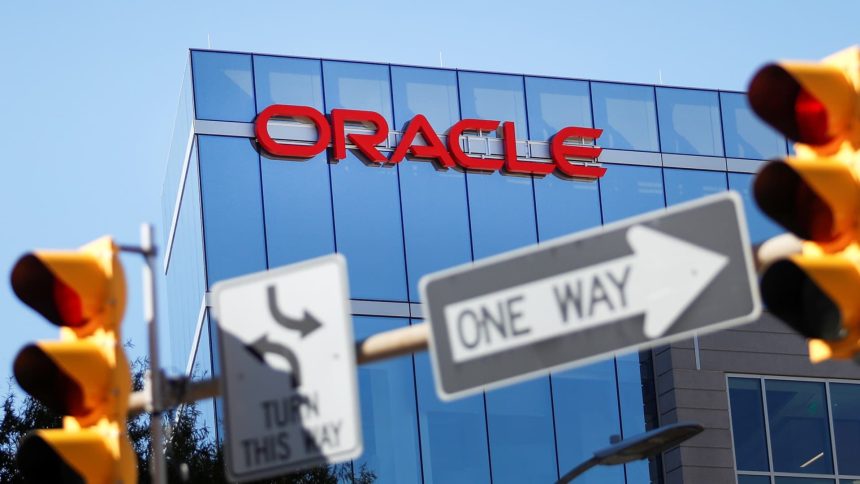Oracle’s (ORCL) quarterly results Monday evening should brighten the spotlight on the Club holding’s still-under-the-radar artificial intelligence capabilities. Wall Street sees Oracle earning $1.15 per share on revenue of $12.47 billion in its fiscal 2024 first quarter, according to estimates compiled by LSEG, formerly known as Refinitiv. That would represent 11.65% growth in EPS on an annual basis and about 9% topline growth. Oracle shares are trading near their all-time closing high of $126.55 on June 15. The stock has gained more than 50% in 2023. ORCL YTD mountain Oracle YTD peformance “I think Oracle has become the star of the show,” said Jim Cramer, who believes that a transformation at this legacy tech firm is propelling it into a leadership position in the generative AI race among cloud service providers. The company’s close ties with Nvidia (NVDA) — the dominant AI chipmaker and a fellow Club name — have helped Oracle Cloud Infrastructure, or OCI, become an increasingly attractive platform for companies doing work with the emerging technology. Oracle has “cemented their relationship with Jensen Huang,” Jim said, referring to Nvidia’s CEO. Oracle’s cloud-computing business is smaller than the top U.S. hyperscalers: Amazon Web Services (AWS), Microsoft’s Azure and Google Cloud. But OCI has been growing like a weed and turning into a more meaningful chunk of companywide revenue. In the three months that ended May 31, Oracle cloud infrastructure unit revenue jumped 76% on an annual basis, to $1.4 billion, roughly 10% of the company’s total. Amazon (AMZN), Microsft (MSFT) and Google-parent Alphabet (GOOGL) are also Club stocks. OCI’s performance in the soon-to-be reported fiscal first quarter – along with management’s commentary on its future AI opportunity – should drive post-earnings trading in Oracle’s stock, Barclays said in a note to clients Thursday. In that regard, Oracle has a favorable setup because OCI is likely to post a “healthy beat” compared to expectations, the analysts wrote. Barclays upgraded Oracle to a buy-equivalent rating on Tuesday, citing a multiyear growth story rooted in OCI and other key Oracle businesses that are moving to the cloud. The analysts there also increased their price target on the stock to $150 per share from $126. Analysts at UBS struck a similar tone last week when they also upgraded Oracle stock to buy. In a note to clients, the firm argued that, if Oracle’s much-larger software and traditional database businesses remain at least stable, additional cloud-computing momentum should keep lifting Oracle shares higher. UBS also raised its price target on Oracle to $140 per share from $120. UBS has become more confident that Oracle has “carved out an under-appreciated edge” in its access to Nvidia’s leading graphics processing units (GPUs) and the way OCI’s architecture allows clusters of those GPUs to work together efficiently, the analysts wrote. This one-two punch has been “enough to attract new customers and drive OCI usage,” UBS said, particularly given that demand for Nvidia GPUs far outpaces supply right now as seen in Nvidia’s latest stellar earnings report . Wall Street analysts have become more bullish on Oracle – evidenced by the fresh buy ratings and price target hikes at Barclays and UBS – but the company remains considerably less loved than other Club holdings that have asserted themselves as generative AI leaders. Jim believes Oracle belongs in that camp, too. Only 52% of analysts have a buy-equivalent rating on Oracle shares, according to FactSet, compared with 94% for Nvidia and 86% for Microsoft, a close partner of the startup that created ChatGPT. Semiconductor firm Broadcom (AVGO), another AI-exposure play and also a Club name, has a buy-equivalent rating from three-quarters of the analysts covering the company, according to FactSet. Of course, a variety of factors go into an analyst’s rating on a stock — and, in Oracle’s case, AI-linked revenue is still a small piece of its topline. Even so, the fact that 15 of the 33 analysts covering Oracle have a neutral rating on the stock lends credence to the idea that its AI opportunity is in the early innings and incremental buyers lurk in the wings as the story progresses. Plus, at less than 22 times forward earnings, Oracle is reasonably valued compared with peers — not to mention the market, with the S & P 500 at 18.7 times. Bottom line We’re already believers in the story, prompting us to initiate a position last month at under $116 per share. We expect that, over time, Oracle’s AI execution and growing cloud share should attract new investors to the stock and convince more analysts of its potential. Another strong Monday’s earnings report may help do just that. (Jim Cramer’s Charitable Trust is long ORCL, NVDA, MSFT, AMZN, GOOGL and AVGO. See here for a full list of the stocks.) As a subscriber to the CNBC Investing Club with Jim Cramer, you will receive a trade alert before Jim makes a trade. Jim waits 45 minutes after sending a trade alert before buying or selling a stock in his charitable trust’s portfolio. If Jim has talked about a stock on CNBC TV, he waits 72 hours after issuing the trade alert before executing the trade. THE ABOVE INVESTING CLUB INFORMATION IS SUBJECT TO OUR TERMS AND CONDITIONS AND PRIVACY POLICY , TOGETHER WITH OUR DISCLAIMER . NO FIDUCIARY OBLIGATION OR DUTY EXISTS, OR IS CREATED, BY VIRTUE OF YOUR RECEIPT OF ANY INFORMATION PROVIDED IN CONNECTION WITH THE INVESTING CLUB. NO SPECIFIC OUTCOME OR PROFIT IS GUARANTEED.
Oracle’s (ORCL) quarterly results Monday evening should brighten the spotlight on the Club holding’s still-under-the-radar artificial intelligence capabilities.
Read the full article here
News Room




